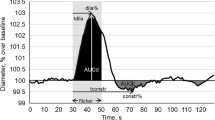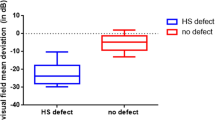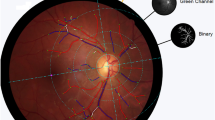Abstract
Purpose
To analyze neurovascular coupling in the retina of untreated primary open-angle glaucoma (POAG) and ocular hypertension (OHT) patients.
Patients and methods
Maximal vessel dilation in response to flicker light was analyzed with Retinal Vessel Analyzer (RVA) in temporal superior/inferior arterioles and veins in 51 POAG patients, 46 OHT and 59 control subjects. RVA parameters were compared between groups, between contralateral POAG eyes, and correlated to intraocular pressure, visual field mean defect and retinal nerve fiber layer thickness.
Results
POAG eyes demonstrated generally smaller response of all vessels to flicker light than the other two groups (ANOVA p = 0.026; mean arterial flicker response in percent of baseline, averaged superior and inferior was 3.48 ± 2.22 % for controls , 2.35 ± 2.06 % for POAG patients , and 2.97 ± 2.35 % for OHT patients; corresponding values for venules were 3.88 ± 1.98 %, 2.89 ± 1.72 %, 3.45 ± 2.77 %). There was no difference in flicker response between the eye with more and less advanced damage in each patient of the POAG group (ANOVA p = 0.79). Correlation of flicker response to intraocular pressure (IOP) was borderline at best, correlations to the level of glaucomatous damage were not significant. Correlation of flicker response of superior and inferior vessels of the same eye was significant for the arteries (Pearson r = 0.23, p = 0.004), as well as venules (r = 0.52, p < 0.001).
Conclusion
General vessel response to flicker light was decreased in POAG patients, compared to normal controls and OHT patients. In contrast to significant correlation between the two contralateral eyes of the flicker response itself, only its borderline correlation to IOP was seen. There was no correlation to the level of damage, altogether indicating a systemic dysregulation phenomenon.
Grants
Swiss National Foundation Grant 3200B0-113685, Velux Stiftung Grant, Freie Akademische Gesellschaft (FAG) Grant, Pfizer Inc. Grant
Clinical trial registration reference number
ClinicalTrials.gov NCT00430209




Similar content being viewed by others
References
Bonvento G, Sibson N, Pellerin L (2002) Does glutamate image your thoughts? Trends Neurosci 25:359–364
Attwell D, Buchan A, Charpak S, Ritzen M, Macvicar BA, Newman EA (2010) Glial and neuronal control of brain. Nature 468:232–243
Gugleta K, Fuchsjager-Mayrl G, Orgul S (2007) Is neurovascular coupling of relevance in glaucoma? Surv Ophthalmol 52(Suppl 2):S139–S143
Garhofer G, Zawinka C, Resch H, Huemer KH, Schmetterer L, Dorner GT (2004) Response of retinal vessel diameters to flicker stimulation in patients with early open angle glaucoma. J Glaucoma 13:340–344
Riva CE, Salgarello T, Logean E, Colotto A, Galan EM, Falsini B (2004) Flicker-evoked response measured at the optic disc rim is reduced in ocular hypertension and early glaucoma. Invest Ophthalmol Vis Sci 45:3662–3668
Zeitz O, Mayer J, Hufnagel D, Praga R, Wagenfeld L, Galambos P, Wiermann A, Rebel C, Richard G, Klemm M (2009) Neuronal activity influences hemodynamics in the paraoptic short posterior ciliary arteries: a comparison between healthy and glaucomatous subjects. Invest Ophthalmol Vis Sci 50:5846–5850
Flammer J, Orgul S, Costa VP, Orzalesi N, Krieglstein GK, Serra LM, Renard JP, Stefánsson E (2002) The impact of ocular blood flow in glaucoma. Prog Retin Eye Res 21:359–393
Flammer J (2001) Glaucomatous optic neuropathy: a reperfusion injury. Klin Monatsbl Augenheilkd 218:290–291
Seifertl BU, Vilser W (2002) Retinal Vessel Analyzer (RVA)—design and function. Biomed Tech (Berl) 47(Suppl 1 Pt 2):678–681
Vilser W, Nagel E, Lanzl I (2002) Retinal Vessel Analysis—new possibilities. Biomed Tech (Berl) 47(Suppl 1 Pt 2):682–685
Pache M, Nagel E, Flammer J (2002) Reproducibility of measurements with the retinal vessel analyzer under optimal conditions. Klin Monatsbl Augenheilkd 219:523–527
Nagel E, Vilser W, Fink A, Riemer T (2006) Variance of retinal vessel diameter response to flicker light a methodical clinical study. Ophthalmologe 103:114–119
Garhofer G, Bek T, Boehm AG, Gherghel D, Grunwald J, Jeppesen P, Kergoat H, Kotliar K, Lanzl I, Lovasik JV, Nagel E, Vilser W, Orgul S, Schmetterer L, Ocular Blood Flow Research Association (2010) Use of the retinal vessel analyzer in ocular blood flow research. Acta Ophthalmologica 88:717–722
Gugleta K, Kochkorov A, Waldmann N, Polunina A, Katamay R, Flammer J, Orgul S (2012) Dynamics of retinal vessel response to flicker light in glaucoma patients and ocular hypertensives. Graefe's Arch Clin Exp Ophthalmol 250:589–594
Gugleta K, Zawinka C, Rickenbacher I, Kochkorov A, Katamay R, Flammer J, Orgul S (2006) Analysis of retinal vasodilation after flicker light stimulation in relation to vasospastic propensity. Invest Ophthalmol Vis Sci 47:4034–4041
European Glaucoma Society EGS (2008) Perimetry. In: EGS, Terminology and guidlines for glaucoma. Dogma, Savona pp 82–87
Wimpissinger B, Resch H, Berisha F, Weigert G, Schmetterer L, Polak K (2005) Response of retinal blood flow to systemic hyperoxia in smokers and nonsmokers. Graefes Arch Clin Exp Ophthalmol 243:646–652
Gugleta K, Polunina A, Kochkorov A, Waldmann N, Portmann N, Katamay R, Flammer J, Orgul S (2012) Association Between Risk Factors and Glaucomatous Damage in Untreated Primary Open-angle Glaucoma. J Glaucoma [Epub ahead of print]
Flammer J (1986) The concept of visual field indices. Graefes Arch Clin Exp Ophthalmol 224:389–392
Medeiros FA, Zangwill LM, Bowd C, Weinreb RN (2004) Comparison of the GDx VCC scanning laser polarimeter, HRT II confocal scanning laser ophthalmoscope, and stratus OCT optical coherence tomograph for the detection of glaucoma. Arch Ophthalmol 122:827–837
Wollstein G, Ishikawa H, Wang J, Beaton SA, Schuman JS (2005) Comparison of three optical coherence tomography scanning areas for detection of glaucomatous damage. Am J Ophthalmol 139:39–43
Resch H, Schmidl D, Hommer A, Rensch F, Jonas JB, Fuchsjäger-Mayrl G, Garhöfer G, Vass C, Schmetterer L (2011) Correlation of optic disc morphology and ocular perfusion parameters in patients with primary open angle glaucoma. Acta Ophthalmologica 89(7):e544–e549
Garhofer G, Resch H, Weigert G, Lung S, Simader C, Schmetterer L (2005) Short-term increase of intraocular pressure does not alter the response of retinal and optic nerve head blood flow to flicker stimulation. Invest Ophthalmol Vis Sci 46:1721–1725
Nagel E, Vilser W, Lanzl I (2001) Retinal vessel reaction to short-term IOP elevation in ocular hypertensive and glaucoma patients. Eur J Ophthalmol 11:338–344
Nagel E, Vilser W, Lanzl I (2002) Functional analysis of retinal vessel diameter reaction to artificially raised intraocular pressure in glaucoma patients with and without dorzolamide therapy. Vasa 31:230–234
Buerk DG, Riva CE, Cranstoun SD (1996) Nitric oxide has a vasodilatory role in cat optic nerve head during flicker stimuli. Microvasc Res 52:13–26
Dorner GT, Garhofer G, Kiss B, Polska E, Polak K, Riva CE, Schmetterer L (2003) Nitric oxide regulates retinal vascular tone in humans. Am J Physiol Heart Circ Physiol 285:H631–H636
Cohen Z, Bouchelet I, Olivier A, Villemure JG, Ball R, Stanimirovic DB, Hamel E (1999) Multiple microvascular and astroglial 5-hydroxytryptamine receptor subtypes in human brain: molecular and pharmacologic characterization. J Cereb Blood Flow Metab 19:908–917
Climent B, Zsiros E, Stankevicius E, de la Villa P, Panyi G, Simonsen U, García-Sacristán A, Rivera L (2011) Intact rat superior mesenteric artery endothelium is an electrical syncytium and expresses strong inward rectifier K + conductance. Biochem Biophys Res Commun 410:501–507
Kuo L, Davis MJ, Chilian WM (1990) Endothelium-dependent, flow-induced dilation of isolated coronary arterioles. Am J Physiol 259:H1063–H1070
Kuo L, Arko F, Chilian WM, Davis MJ (1993) Coronary venular responses to flow and pressure. Circ Res 72:607–615
Fadini GP, Pagano C, Baesso I, Kotsafti O, Doro D, de Kreutzenberg SV, Avogaro A, Agostini C, Dorigo MT (2010) Reduced endothelial progenitor cells and brachial artery flow-mediated dilation as evidence of endothelial dysfunction in ocular hypertension and primary open-angle glaucoma. Acta Ophthalmol 88:135–141
Kuo L, Chilian WM, Davis MJ (1991) Interaction of pressure- and flow-induced responses in porcine coronary resistance vessels. Am J Physiol 261:H1706–H1715
Flammer J, Haefliger IO, Orgul S, Resink T (1999) Vascular dysregulation: a principal risk factor for glaucomatous damage? J Glaucoma 8:212–219
Polak K, Luksch A, Berisha F, Fuchsjaeger-Mayrl G, Dallinger S, Schmetterer L (2007) Altered nitric oxide system in patients with open-angle glaucoma. Arch Ohthalmol 125:494–498
Harizman N, Oliveira C, Chiang A, Tello C, Marmor M, Ritch R, Liebmann JM (2006) The ISNT rule and differentiation of normal from glaucomatous eyes. Arch Ophthalmol 124:1579–1583
Conflict of interest
None
Author information
Authors and Affiliations
Corresponding author
Additional information
Authors have full control of all primary data and agree to allow Graefes Archive for Clinical and Experimental Ophthalmology to review their data upon request.
Rights and permissions
About this article
Cite this article
Gugleta, K., Waldmann, N., Polunina, A. et al. Retinal neurovascular coupling in patients with glaucoma and ocular hypertension and its association with the level of glaucomatous damage. Graefes Arch Clin Exp Ophthalmol 251, 1577–1585 (2013). https://doi.org/10.1007/s00417-013-2276-9
Received:
Revised:
Accepted:
Published:
Issue Date:
DOI: https://doi.org/10.1007/s00417-013-2276-9




